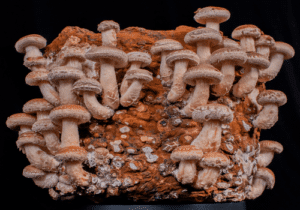
SHIITAKE: Grow Kit Instructions
Learn how to grow Shiitake mushrooms using the Myterra Labs
RECEIVE 10% OFF ON YOUR FIRST ORDER! – USE CODE: WELCOME10
Mushrooms are a popular ingredient in many dishes around the world, but have you ever wondered how they are grown? One of the important steps in the mushroom cultivation process is the use of grain spawn. Grain spawn refers to a substrate that is inoculated with mushroom spores or mycelium, which is then used to propagate the mushrooms. In this blog post, we will explain why mushrooms are cultivated on grains before they are mixed into a fruiting substrate and why organic grains are important to use to make grain spawn.
Mushroom cultivation is a complex process that requires attention to detail and proper knowledge of the biological needs of the mushrooms. One of the crucial steps in mushroom cultivation is the preparation of the spawn, which is used to inoculate the fruiting substrate. Spawn can be likened to a plant seed in this sense, and its quality can significantly affect the yield and quality of the mushrooms.
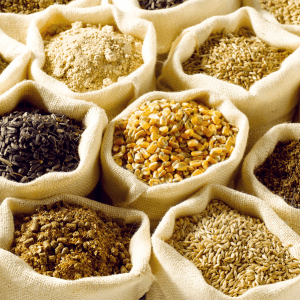
Rye Grain spawn is one of the most common types of spawn used in mushroom cultivation. The process of creating grain spawn involves sterilizing and inoculating grains such as rye, oats, or millet with mushroom spores or mycelium. The grains provide a nutritious and easily digestible substrate for the mycelium to grow and develop. Think of grains as being similar to baby food for mushrooms. Once the mycelium has colonized the grains, the grain spawn is then used to inoculate the fruiting substrate.
The fruiting substrate is the material on which the mushrooms will grow and produce their fruiting bodies (AKA mushrooms). The fruiting substrate can be made up of various materials such as sawdust, straw, or coco coir, and its composition will depend on the type of mushroom being cultivated. The grain spawn is mixed into the fruiting substrate, and the mycelium will continue to grow and colonize the substrate, eventually producing mushrooms.
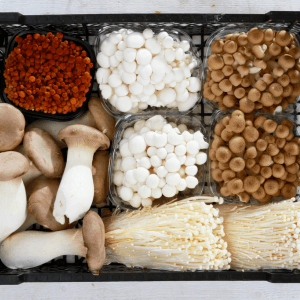
There are several reasons why mushrooms are cultivated on grains before being mixed into the fruiting substrate. First, the grains provide a nutritious substrate that is easy for the mycelium to colonize. The grains are rich in nutrients such as carbohydrates and proteins, which provide the mycelium with the energy it needs to grow and develop. The mycelium can quickly colonize the grains, which allows for fast and efficient propagation of the mushroom.
Second, using grain spawn helps to ensure the consistency and quality of the mushrooms. By using grain spawn, growers can control the genetics of the mushrooms and ensure that they are growing a consistent and reliable strain. This is especially important for commercial growers who need to produce consistent yields of high-quality mushrooms.
Finally, using grain spawn helps to reduce the risk of contamination in the mushroom cultivation process. By sterilizing the grains before inoculating them with the mushroom spores or mycelium, growers can ensure that the substrate is free of contaminants that could interfere with the growth and development of the mycelium. This is important because contamination can significantly reduce the yield and quality of the mushrooms.
When it comes to growing mushrooms, the quality of the substrate is crucial. The quality of the substrate can significantly affect the yield and quality of the mushrooms, which is why it is important to use high-quality, organic grains to make grain spawn.
Organic grains are grains that have been grown without the use of synthetic fertilizers, pesticides, or other chemicals. Organic farming practices promote the use of natural and sustainable methods to grow crops, which helps to preserve the health of the soil, water, and air.
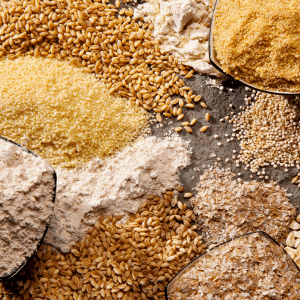
Using organic grains to make mushroom spawn offers several benefits.
First, organic grains are free of synthetic chemicals and pesticides, which can be harmful to the environment and human health. By using organic grains, growers can ensure that their mushrooms are free of harmful chemicals and toxins.
Second, organic grains are often more nutrient-dense than convention
ally grown grains. This is because organic farming practices promote the use of natural and sustainable methods to enhance soil health and fertility. This means that the soil is rich in nutrients and minerals that are essential for plant growth, which in turn leads to more nutrient-dense grains.
Using nutrient-dense grains to make grain spawn can have a significant impact on the growth and development of the mushrooms. The mycelium needs a nutrient-rich substrate to grow and develop properly, and using organic grains can provide this. This can lead to faster growth rates, higher yields, and better quality mushrooms.
Additionally, using organic grains helps to support sustainable farming practices. Organic farming practices are designed to promote the health of the environment, soil, and local ecosystems. By using organic grains to make grain spawn, growers can support these practices and contribute to a more sustainable food system.
Furthermore, using organic grains can also have an impact on the flavor and quality of the mushrooms. Research has shown that organic farming practices can lead to a more diverse and healthy microbiome in the soil, which can enhance the flavor and nutrient content of crops. This means that mushrooms grown on organic grain spawn may have a more complex and desirable flavor profile.
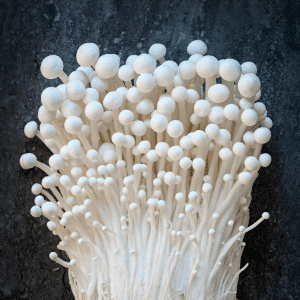
Mushrooms are cultivated on grains before being mixed into a fruiting substrate for several reasons. Grain spawn provides a nutritious and easily digestible substrate for the mycelium to grow and develop, helps to ensure the consistency and quality of the mushrooms, and reduces the risk of contamination.
Start growing mushrooms on top quality, sterile grains today.
Mushrooms are a popular ingredient in many dishes around the world, but have you ever wondered how they are grown? One of the important steps in the mushroom cultivation process is the use of grain spawn. Grain spawn refers to a substrate that is inoculated with mushroom spores or mycelium, which is then used to propagate the mushrooms. In this blog post, we will explain why mushrooms are cultivated on grains before they are mixed into a fruiting substrate and why organic grains are important to use to make grain spawn.
Mushroom cultivation is a complex process that requires attention to detail and proper knowledge of the biological needs of the mushrooms. One of the crucial steps in mushroom cultivation is the preparation of the spawn, which is used to inoculate the fruiting substrate. Spawn can be likened to a plant seed in this sense, and its quality can significantly affect the yield and quality of the mushrooms.

Rye Grain spawn is one of the most common types of spawn used in mushroom cultivation. The process of creating grain spawn involves sterilizing and inoculating grains such as rye, oats, or millet with mushroom spores or mycelium. The grains provide a nutritious and easily digestible substrate for the mycelium to grow and develop. Think of grains as being similar to baby food for mushrooms. Once the mycelium has colonized the grains, the grain spawn is then used to inoculate the fruiting substrate.
The fruiting substrate is the material on which the mushrooms will grow and produce their fruiting bodies (AKA mushrooms). The fruiting substrate can be made up of various materials such as sawdust, straw, or coco coir, and its composition will depend on the type of mushroom being cultivated. The grain spawn is mixed into the fruiting substrate, and the mycelium will continue to grow and colonize the substrate, eventually producing mushrooms.

There are several reasons why mushrooms are cultivated on grains before being mixed into the fruiting substrate. First, the grains provide a nutritious substrate that is easy for the mycelium to colonize. The grains are rich in nutrients such as carbohydrates and proteins, which provide the mycelium with the energy it needs to grow and develop. The mycelium can quickly colonize the grains, which allows for fast and efficient propagation of the mushroom.
Second, using grain spawn helps to ensure the consistency and quality of the mushrooms. By using grain spawn, growers can control the genetics of the mushrooms and ensure that they are growing a consistent and reliable strain. This is especially important for commercial growers who need to produce consistent yields of high-quality mushrooms.
Finally, using grain spawn helps to reduce the risk of contamination in the mushroom cultivation process. By sterilizing the grains before inoculating them with the mushroom spores or mycelium, growers can ensure that the substrate is free of contaminants that could interfere with the growth and development of the mycelium. This is important because contamination can significantly reduce the yield and quality of the mushrooms.
When it comes to growing mushrooms, the quality of the substrate is crucial. The quality of the substrate can significantly affect the yield and quality of the mushrooms, which is why it is important to use high-quality, organic grains to make grain spawn.
Organic grains are grains that have been grown without the use of synthetic fertilizers, pesticides, or other chemicals. Organic farming practices promote the use of natural and sustainable methods to grow crops, which helps to preserve the health of the soil, water, and air.

Using organic grains to make mushroom spawn offers several benefits.
First, organic grains are free of synthetic chemicals and pesticides, which can be harmful to the environment and human health. By using organic grains, growers can ensure that their mushrooms are free of harmful chemicals and toxins.
Second, organic grains are often more nutrient-dense than convention
ally grown grains. This is because organic farming practices promote the use of natural and sustainable methods to enhance soil health and fertility. This means that the soil is rich in nutrients and minerals that are essential for plant growth, which in turn leads to more nutrient-dense grains.
Using nutrient-dense grains to make grain spawn can have a significant impact on the growth and development of the mushrooms. The mycelium needs a nutrient-rich substrate to grow and develop properly, and using organic grains can provide this. This can lead to faster growth rates, higher yields, and better quality mushrooms.
Additionally, using organic grains helps to support sustainable farming practices. Organic farming practices are designed to promote the health of the environment, soil, and local ecosystems. By using organic grains to make grain spawn, growers can support these practices and contribute to a more sustainable food system.
Furthermore, using organic grains can also have an impact on the flavor and quality of the mushrooms. Research has shown that organic farming practices can lead to a more diverse and healthy microbiome in the soil, which can enhance the flavor and nutrient content of crops. This means that mushrooms grown on organic grain spawn may have a more complex and desirable flavor profile.

Mushrooms are cultivated on grains before being mixed into a fruiting substrate for several reasons. Grain spawn provides a nutritious and easily digestible substrate for the mycelium to grow and develop, helps to ensure the consistency and quality of the mushrooms, and reduces the risk of contamination.
Start growing mushrooms on top quality, sterile grains today.

Learn how to grow Shiitake mushrooms using the Myterra Labs

Selecting the right substrate is a key element in successful
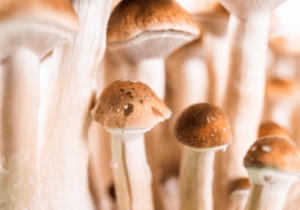
Welcome to the enchanting realm of our All-in-one Grow Kit,
© 2023 Myterra Labs. Designed by Laura Ramsay. Developed by Info2grow Media Services.